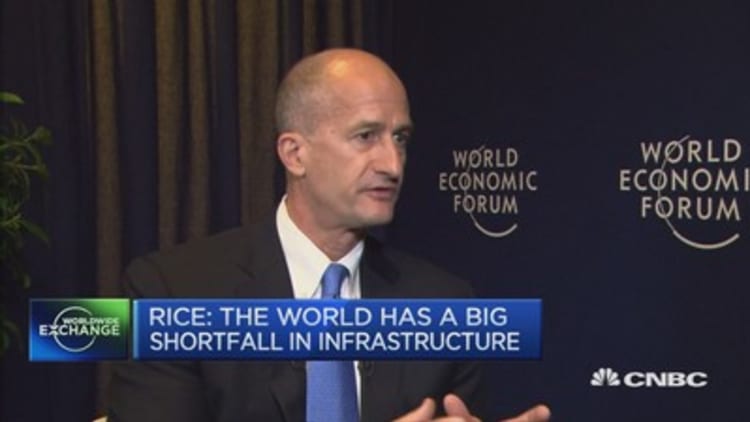The world's third-largest economy is likely to stick by its ally the United States and refrain from joining a new, Chinese-dominated development bank that's expected to launch this year. But that could change further down the line.
The Asia Infrastructure Investment Bank (AIIB), which is being presented by China as an Asia-centric alternative to the International Monetary Fund and the World Bank, has drawn 57 prospective founding members from all over the world, including Western economic powers Germany, Italy, France and the United Kingdom.
But notably absent from that group is Japan.
Takatoshi Ito, a Japan economist and a professor at Columbia University, said that because Japan regards the AIIB as a bank run by China, it is unlikely that it will join.
The AIIB's voting rights structure would give greater weight to Beijing when it comes to decision-making. The ownership of the AIIB is likely to be determined by GDP size, making China the largest shareholder. China has previously stated that 75 percent of shares in the bank will be allocated to Asian members and 25 percent to non-Asian members.
"Japan will not be able to stop what China wants to do," said Ito. In 2013, China had a GDP of $9.24 trillion compared with $4.92 trillion for Japan, according to the World Bank.
Read MoreBlame US Congress for China's creation of AIIB: Bernanke
In addition, there will be no resident board of directors to provide a check on power within the bank. The process to determine how funds will be allocated will follow the lead of the AIIB's president—a person most likely to be Chinese.
"Decisions will be heavily skewed toward what China wants," said Ito. "Japan fears that this will be used for projects China wants to push."
But the decision to stay away from the AIIB could become costly—it could mean that Japanese firms are locked out of bidding for AIIB-funded development projects, for example.
A lack of participation by Japan would also deprive the AIIB of the expertise the country has acquired throughout the years, especially through its own work with the Asian Development Bank (ADB). The Japanese-dominated ADB, which was created in the late 1960s, states as its goal the eradication of poverty in Asia through projects related to infrastructure and health care.

Japan's decision not to join the AIIB has pushed the country to focus greater efforts toward the ADB. In May, Japan announced that it will provide $110 billion over five years to support ADB's projects. The bank currently has a capital base of $153.05 billion.
"We should attract more diverse capital to Asia from around the world to change the region into the place where dynamic innovation comes into full bloom," said Prime Minister Shinzo Abe, as reported by The Japan Times.
Ito explained that it's possible for more than one development bank to work simultaneously in Asia, since the ADB and the World Bank already coexist. Japan, in fact, is a member of both.
Read MoreWhy Europe is breaking ranks with US on China bank
Several Western countries and American allies have already joined the AIIB as founding members. In addition to four G-7 members from Europe, Australia's decision to join was a big victory for Beijing. And with Japan hosting the G-7 summit in 2016, things might change for Japan in the long run, too, said Raj Desai, a nonresident senior Brookings Institute fellow and associate professor of international development at Georgetown University.
"Japan will recognize the need to be involved in what will probably become an important development institution in Asia," said Desai.
The European countries that have joined the AIIB have done so because of the prospective economic opportunities and frustration with the lack of reforms in some of the existing institutions. For instance, the U.S. Congress still has not voted on IMF reforms that were first approved by the fund back in 2010, leaving some large nations with small voting rights, said Desai. Take China, for example: Despite its large GDP, China's IMF vote weights as 3.81 percent of the total. That compares with France, which holds a 4.29 percent voting share.
Keep your friends close, but your enemies closer.Raj Desaiassociate professor of international development, Georgetown University
Decisions by the United States and Japan not to join the AIIB could have negative geopolitical ramifications for both countries.
"The lack of participation by the U.S. combined with other things has signaled to Asian countries ... that the U.S. is withdrawing from Asia," Desai said.
Desai explained that if the two countries are worried about China's agenda, that should encourage them to participate, not the opposite. He used a quote from Francis Ford Coppola's "Godfather II":
"Keep your friends close, but your enemies closer," he said.
The Korea Institute for International Economic Policy's executive director, Lim Ho-yeol, estimates that China will be AIIB's largest shareholder with 29.8 percent, followed by India (8.4 percent), Russia (6.5 percent), Germany (4.5 percent) and South Korea (3.7 percent).
Desai said there is shortfall of infrastructure funding in Asia, which means there's room for the AIIB. A 2013 report from HSBC indicated that the continent needed $11.5 trillion in infrastructure investment in order to meet the needs of Asia's urban population, by the end of that year alone

